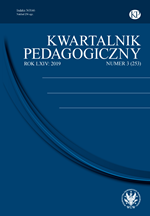Uczestnictwo w zajęciach lekcyjnych i pozalekcyjnych w zależności od stanu zdrowia uczniów oraz wybranych czynników kontekstowych
Participation in classes and extracurricular activities depending on students’ health and selected contextual factors
Author(s): Aleksandra Berkowska, Anna Kowalewska, Joanna MazurSubject(s): Social Sciences, Education
Published by: Wydawnictwa Uniwersytetu Warszawskiego
Keywords: health; chronic diseases; education; school activities; extracurricular activities
Summary/Abstract: The article is devoted to the problem of pupils’ perception of difficulties in participating in classes and extracurricular activities. The research was carried out in Poland as part of the international HBSC (Health Behavior in School-aged Children) study in the school year 2013/2014. Data refer to 3,448 schoolkids who completed an extended questionnaire about functioning in a school environment. The research covered five school years – from the fifth grade of primary school to the third grade of lower secondary school. The average age of the respondents was 14.2 years (SD = 1.7). The aim of this work was to compare the pupils’ perception of difficulties in access to school and extracurricular activities depending on the health conditions and selected socio-demographic factors. The obtained results indicate that only one in five pupils declared complete lack of difficulty. The results of the average values of the scale of “restrictions on participation in extracurricular activities and after-school programmes” showed a significant relationship with the sex and wealth of the family, to the detriment ofThe article is devoted to the problem of pupils’ perception of difficulties in participating in classes and extracurricular activities. The research was carried out in Poland as part of the international HBSC (Health Behavior in School-aged Children) study in the school year 2013/2014. Data refer to 3,448 schoolkids who completed an extended questionnaire about functioning in a school environment. The research covered five school years – from the fifth grade of primary school to the third grade of lower secondary school. The average age of the respondents was 14.2 years (SD = 1.7). The aim of this work was to compare the pupils’ perception of difficulties in access to school and extracurricular activities depending on the health conditions and selected socio-demographic factors. The obtained results indicate that only one in five pupils declared complete lack of difficulty. The results of the average values of the scale of “restrictions on participation in extracurricular activities and after-school programmes” showed a significant relationship with the sex and wealth of the family, to the detriment of boys and poor families. Pupils with diseases and health problems more often declared that they had difficult access to school and extracurricular activities. Analyses taking into account the state of health of the respondents and the socio-economic status of the family and place of residence indicated that these differences are not offset by children from rich families living in medium-sized cities. An important task of the school in order to equalise educational opportunities is to diagnose the needs related to the students’ health conditions but also taking into account environmental conditions.
Journal: Kwartalnik Pedagogiczny
- Issue Year: 253/2019
- Issue No: 3
- Page Range: 207-222
- Page Count: 16
- Language: Polish
- Content File-PDF

